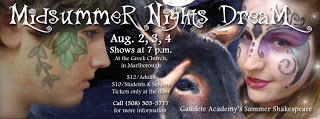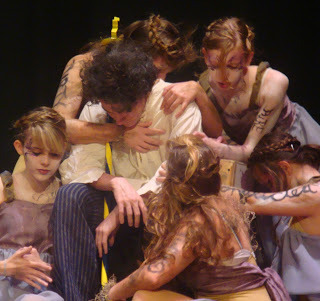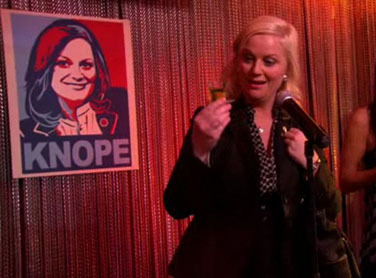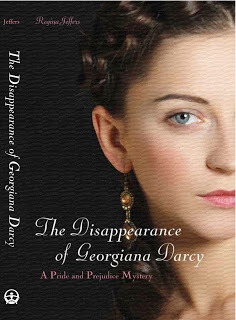Emily C.A. Snyder's Blog, page 7
July 1, 2012
Free Books? Yes, Please!
 Exclusive offer!
Exclusive offer!For the month of July, only, Girlebooks is offering discounted books through Smashwords !
For this month, you can purchase Nachtsturm Castle at 50% off...
While you can get Letters of Love & Deception ...for FREE!
So what are you waiting for? Get to reading!
Published on July 01, 2012 11:27
June 26, 2012
Dreaming of Midsummer
One of the great pleasures I have in theatre is making posters for my plays. What I've realized, though, is that no matter what one's "concept" for a show (particularly Shakespeare), at least the better known shows just want the Iconic Image. Macbeth really ought to just be Mackers, some sharp instrument, considerable blood, and a crazy-hot wife. Romeo and Juliet is just Romeo and Juliet. If the Nurse is on the poster, there's a problem.
Similarly, although our Midsummer's is beginning to explore questions not only of love, but also of trust. There's all sorts of neat stuff happening in rehearsal. However, for the purposes of the poster, people really want to see a fairy and a donkey. Which is all right by me! Hence, without further ado, the Facebook cover (make-up courtesy of my assistant stage manager, and former Katherina Minola) - true poster to follow soon! Enjoy!


Similarly, although our Midsummer's is beginning to explore questions not only of love, but also of trust. There's all sorts of neat stuff happening in rehearsal. However, for the purposes of the poster, people really want to see a fairy and a donkey. Which is all right by me! Hence, without further ado, the Facebook cover (make-up courtesy of my assistant stage manager, and former Katherina Minola) - true poster to follow soon! Enjoy!

Published on June 26, 2012 22:57
June 24, 2012
Beer and Benediction: Or How CAUSE Began
 Today I'm guest blogging over at CAUSE's (Catholic Artists of the United States Effect)
new blog
! Make sure you check out:
Today I'm guest blogging over at CAUSE's (Catholic Artists of the United States Effect)
new blog
! Make sure you check out:Beer and Benediction
And then leave your own story. What do you as an artist really need? How can CAUSE serve you?
Published on June 24, 2012 15:37
May 17, 2012
The Sweeper of Dreams
 A few days ago, my dear friend, Kristen, turned me on to this nifty contest that the English National Opera (
ENO
) is holding for
Mini-Operas
. At the moment, the libretto portion is underway, which will be followed by composition and - rather intriguingly - film direction.
A few days ago, my dear friend, Kristen, turned me on to this nifty contest that the English National Opera (
ENO
) is holding for
Mini-Operas
. At the moment, the libretto portion is underway, which will be followed by composition and - rather intriguingly - film direction.One of the mentors is the fellow who's been bringing us the filmed versions of the Metropolitan Opera . Several of the participants have also worked on the Met's The Enchanted Island which is a pastiche of Shakespeare's The Tempest...which I got to do with some rather talented folks at Hudson High School. (See above.)
 To help out the librettists, three splendid folk gave "seed stories." The one that intrigued me (quelle surprise) was Neil Gaiman's "
The Sweeper of Dreams
." The good folks holding the competition have asked that each participant put their entry on their blog (which means that I've gotten to read several other sterling librettos for the same story - my favourite of which is
here
).
To help out the librettists, three splendid folk gave "seed stories." The one that intrigued me (quelle surprise) was Neil Gaiman's "
The Sweeper of Dreams
." The good folks holding the competition have asked that each participant put their entry on their blog (which means that I've gotten to read several other sterling librettos for the same story - my favourite of which is
here
).So, without further ado, I present to you my libretto for The Sweeper of Dreams. You can read it here . Or press the fly out button in the embedded document below. I'd really love to know what you think...so do feel free to leave a comment! Enjoy!
Published on May 17, 2012 13:33
May 9, 2012
Midsummer Night's Dream Character Descriptions
A Midsummer Night’s DreamCharacter Descriptions

Fairy Court
Oberon King of the Fairies, an element of earth and animals, Oberon is a jealous force of nature, who—despite his own previous infidelities to his wife—nevertheless longs for reconciliation with her. His actions throughout the play, while manipulative, are not malicious. He pities Helena, seeing in her plight something of his own argument with Titania, and attempts to put things right for the mortal lovers. As for the trick he plays on Titania, having her fall in love with “something vile,” although harsh, he is attempting to show Titania how her love of the Indian boy (in our case, a man-child) is asinine. Oberon is constantly thwarted by Puck, whose pranks he tolerates but on whom he keeps a tight reign.
Titania Queen of the Fairies, an element of wind and fire, whose servants far outnumber Oberon’s and are drawn from water and plantlife. To spite Oberon, Titania has taken up with an Indian boy (remember, the fairies are immortal, so a “boy” for them is a “young man” for us!) whom she refuses to give up…and even flaunts in front of her husband. When she is unrepentant, she is tricked into falling in love with an ass—which makes her realize the pettiness of her dispute with Oberon. Titania may be best thought of as a thunderstorm.
Puck Oberon’s lieutenant, Puck is a mischief-maker, using willfull ignorance and the letter of the law to subvert the commands he’s given. A satyr, Puck is half man, half goat…but unlike his Grecian predecessors, he’s only chases nymphs recreationally. He’s less interested in sexytimes than in causing chaos. As a fairy, he’s amoral—that is, he is neither good nor bad, but rather reveals people for who they truly are. No matter how extreme his pranks, however, he is always reeled back by Oberon. Preferably played by a man.
Dewdrop Titania’s lieutenant, and chief among all of Titania’s fairies, Dewdrop is blindingly loyal to her mistress. She assists Titania in keeping the Indian Boy in thrall—and in fact, she makes no judgement at all at any of Titania’s paramours. Even the ones who are complete jackasses. However, her head can be easily turned by Puck, with whom she’s enjoyed an eternity of competitive flirting.
Indian Boy Titania’s protégée…and possibly something more…the Indian Boy was given to Titania to raise, much like how Aphrodite raised Adonis. But just like that Greek myth, Titania now dotes unreasonably on the Indian Boy, keeping him infantilized, even though he’s clearly a man. This character can go either the way of Kronk from Emperor’s New Groove, or a sort of Ken doll (a himbo), or any Will Ferrell character. (Will double with Theseus.) Human Court
Theseus The Duke of Athens, known as the “unifying king,” Theseus has recently returned from his voyages where variously journeyed through the underworld, defeated the labyrinth and the Minotaur, and most recently captured the Queen of the Amazons, Hippolyta to be his bride. A warrior and philosopher, Theseus uses both actions and words to his advantage. Like the fairies, he is not known for his fidelity to women: having left Ariadne after she helped him through the labyrinth; stealing off Helen before Paris got the idea; abducting Hippolyta and—after these course of events—ditching the Queen of the Amazons for Phaedra (who went crazy and ruined everybody’s lives). Like the fairies, he could really use a lesson in fidelity! (Will double with the Indian Boy.)
Hippolyta The Queen of the Amazons, newly abducted by Theseus, Hippolyta’s a warrior in her own right. The Amazons were known to capture men and sleep with them, only in order to procreate, at which point they would kill their captive mates. Male children were exiled from their island, which was populated only by women. The Amazons were excellent archers (some say they cut of one breast, the better to shoot), and—except for Hippolyta—none of them ever married. Some myths say that Theseus carried off Hippolyta’s sister, Antiope, whom Oberon is said by Titania to have seduced. Certainly, Theseus “met” Hippolyta when he journeyed with Hercules to get the Queen’s girdle of Ares, god of war and her father, from her. Whomever Theseus abducted, legend say that shortly thereafter, the Amazons attacked the city, but were unsuccessful in regaining their countrywoman.
Philostrate This role depends entirely on whether a male or female plays the part. However, if a woman wants to play the part comically (as in the male interpretation) she is welcome to show this at auditions!
MALE. Philostrate is the servant of Theseus, a slightly stuffy butler who has great disdain for anyone lower class (such as the Rude Mechanicals). Mostly a comic role.
FEMALE. Philostrate is another captured Amazon with Hippolyta, who works as best she can to protect Hippolyta from Theseus’ dubious advances. She is less comical and more warrior-like.
Egeus In Shakespeare’s play, Egeus is the angry father of Hermia, who dislikes her current boyfriend, Lysander, and has instead given his blessing to Demetrius to marry his daughter. Egeus is presumptuous and demanding, the sort of fellow who’s argument to everything is: “I’m a tax-payer!” or “I have rights.” This part may be played by either a man or a woman (a father or a mother respectively). If a woman, she should definitely have “cougar” instincts, and be interested in Demetrius for herself, as well. An interesting side-note: in mythology, Theseus’ father is Aegeus who made several poor decisions in marrying himself (such as marrying Medea aftershe went crazy and killed her own sons!) It’s possible to play a Hermia & Theseus as step-siblings, then!
Four Lovers
Hermia The “Barbie” of the play, Hermia is that pretty, spoiled girl whom every guy wants to be with and every girl wants to be like. Her only insecurities are her height (she’s shorter than Helena) and Lysander’s fidelity. Although she seems shallow, she does appear to be sincerely in love with Lysander (and firmly determined to remain chaste before marriage!). And although she and Helena snipe at each other, they do have a deep bond of sisterly friendship.
Helena Always the best friend, never the Barbie, Helena is the sort of girl that’s kissed all the boys and made them cry. Somewhat taller and less glamorous than Hermia, as well as having lost first Lysander and then Demetrius to her best friend, Helena has become understandably despondent and jealous. However, she’s also very determined, and pursues her goals no matter the cost.
Lysander Hermia’s current boyfriend, Lysander is the town jock who’s always got a girl on his arm (or his lips). In the past, he not-dated Helena for a day, and now is attached to Hermia—who is being frustratingly chaste. Lysander and Demetrius are life-long frenemies, always competing for the same thing.
Demetrius Where Lysander tends to just demand what he wants, Demetrius plans. Understanding that Egeus is the one with real power—and Demetrius loves power—he weaselled his way into Egeus’ favour in order to secure the hand of Hermia. Demetrius has an on-again/off-again relationship with Helena, but while Helena believes this love to be genuine, Demetrius has always viewed Helena as a convenience with benefits. When he doesn’t get what he wants, he can be quite violent.
Rude Mechanicals
Piper Quince Although written as a man, Piper Quince will be played by a woman. The director of the Rude Mechanicals, and presumably one of the playwrights for Pyramus and Thisbe. Bottom’s antics drive her up a wall—but she secretly admires him, harboring a bookish and over-eager romance for this less-than-impressive actor. If possible, she should have a slight lisp, especially on the word “Ninus’s.” (May double with Wall.)
Bottom/PyramusThe divo of the player’s group, Bottom has no end of love for himself. A fellow playwright for Pyramus and Thisbe, he’d make it a one-man show if he could. Everything a lead actor shouldn’t do…he does…and does loudly…and over and over. His middle name could be “Upstage.” So in love with himself, he does not notice the feelings of others, and presumes that everyone is as in love with him as he is. Thus, when the Queen of the Fairies falls for him, he’s completely unsurprised!
Flute/ThisbeThe youngest member of the acting troupe, he’s a talented up and comer. Which is why Bottom convinces Quince (off-stage) to make him be the woman. Unfortunately, Flute is unable to talk anyone out of it, and the more he tries to do a good job playing a woman, the more people seem to laugh at and make fun of him. If possible, he should be bearded or at least have stubble. Ultimately, he’s saved from further embarrassment by one of the other players.
Wall A “solid” company player who doesn’t deal very well with verse drama, and yet still soldiers on.
Moonshine A stutterer who’s nervously taking her first foray into the world of theatre. She may have a crush on Flute.
Lion The slacker actor who is part of the company almost by accident. She is a very gentle soul, fixated on some activity (such as a yoyo, or cat’s cradle, or video game, or whatnot), rather than on her lines.
Published on May 09, 2012 18:18
May 7, 2012
Thoughts about the Dream
Gaudete Academy's 2012 production Preliminary Notes!
When we think of Midsummer Night’s Dream, our first thoughts are often of lovers running helter-skelter, falling in and out of love; fairies making mischief for the mortals; some guy with a donkey’s head, and another guy in a dress. All of this miraculously combines to make one of Shakespeare’s most enduring and endearing comedies. But while our heads are full of the coolest way to apply glitter to a fairy’s face (or how to remove that glitter three months later), we forget what the play is about.
 Many recent production of Midsummer’s tend to focus on the ridiculous nature of the play. One director’s note even blatantly stated that the play had no content at all! But Shakespeare, even in his early comedies, never wrote without a purpose. There are many meanings in Midsummer’s, not the least of which is the nature of love—from puppy love to bad romances to the nuptial bed.
Many recent production of Midsummer’s tend to focus on the ridiculous nature of the play. One director’s note even blatantly stated that the play had no content at all! But Shakespeare, even in his early comedies, never wrote without a purpose. There are many meanings in Midsummer’s, not the least of which is the nature of love—from puppy love to bad romances to the nuptial bed.And Shakespeare wraps all of these ruminations on what love isn’t and what love is in a dream.
This is not insignificant. Dreams aren’t just nonsense—although that one about the Cheese Man might be—rather they’re our subconscious working out of the difficulty part of our dreams. No wonder, then, that the young lovers (who barely know themselves, let alone whom they love!) shift their allegiances continually. No wonder, then, that Bottom who thinks so highly of himself dreams that he’s beloved of a Queen.
But we should probably remember this, too:
Do wish that your wildest dream can come true But never forget—nightmares are dreams, too.
Suddenly a guy running around with an ass’ head makes a lot more sense, huh? As does the continual actor’s nightmare that the Rude Mechanicals experience, and the fickle love that the lovers’ express. Where, then, can we find any waking sanity? Shakespeare gives us the reunited King and Queen of the Fairies, Oberon and Titania to represent the war of the sexes…and the reconciliation, too. And for our purposes, Quince will help Flute/Thisbe’s waking nightmare at the end of Pyramus and Thisbe.
Because one of the best things about a dream is that you always wake up.
Published on May 07, 2012 14:50
April 30, 2012
Strangeways: A Portal to the Past
 This week's Strangeways returns us to the narration of Miss Serafine Meadowlark, and what happened once she went through Mr Jeremy Cavendish Mumm's green door!
This week's Strangeways returns us to the narration of Miss Serafine Meadowlark, and what happened once she went through Mr Jeremy Cavendish Mumm's green door!However, as with anything in Strangeways, not everything is as it seems.
Click on the "Strangeways" link on the ribbon above to view all the previous chapters, and click here or below for this week's chapter!
Published on April 30, 2012 09:16
April 26, 2012
Party On, Catholic Nuns!
 Today, I'd like to talk about the intersection of castanets, Leslie Knope, and nuns. It's gonna be a long one, but here's a dancing nun to keep you going!
Today, I'd like to talk about the intersection of castanets, Leslie Knope, and nuns. It's gonna be a long one, but here's a dancing nun to keep you going!Yup! I love Knope!
I'm a huge fan of Parks and Recreation (on tonight!), the Amy Poehler-helmed show about a can-do, small town, bureaucrat with an obsession with waffles, a tendency to try too hard, and a heart of gold. One of the things I appreciate most about the show is how beautifully, powerfully, quirkily, and honestly it represents friendship between women. As a playwright, and as a woman, I've been hugely frustrated with the lack of two-women scenes...let alone authentic depictions of female friendship. More often, if - and sadly, it's often still "if" - two women dominate the stage, they're at each others' throats, or they feel like women attempting to be male-tough, or they're solely caught up in their separate romantic intrigues and not in the special dynamic that exists between two female friends. We've seen plenty of bromances celebrated...so it's refreshing to see a galmance.
All this is made possible, of course, because of Amy Poehler's unwavering feminism. Today - and even for myself - "feminism" is an evil word, summoning up images of masculinized women bent on the destruction of the other half of the population. Those were the feminists I grew up with: ugly inside and out. Not the women who fought for the right to vote; not my great-aunt who was a working woman in Boston at the turn-of-the-century; or my great-great-aunt who was a short story writer under her own name - but the bitter, men-hating women who changed the laws so that my Caucasian father is now discriminated against in his multiple job searches, who changed society so that my Caucasian brother is low on the list of supposedly merit-based scholarships, who changed men themselves so that my Caucasian professor kept railing against himself for having been born a "white male oppressor." Never mind that those three men are perhaps the most mild-mannered men...heck! Humans that I know!
Therefore, I greatly appreciate Amy Poehler's (and to a different - quirkier - extent, Tina Fey's) contribution to understanding what feminism can be. Although I still don't consider myself a feminist (or, more precisely, a feminazi), I have to admit - and admit proudly - that I find myself more and more invested in bringing representations of actual, strong, strange, and wonderful women to the stage, as a playwright, as a director, as an actress, and as a woman.
 All of which frustrated me as I was re-watching the second season opener, "
Pawnee Zoo
," of Parks and Recreation on Netflix during the show's recent Spring Break. I've seen all the episodes before, of course, but in rewatching them, I had purposely skipped this one since it has such a heavy-handed - and therefore noxiously offensive - message against Christians and for gay marriage. It would have been enough to have the latter. It's the Desperate Housewife waspy WASP who heads the Pawnee Christian coalition who's the real slap in the face. Let me break down the episode:
All of which frustrated me as I was re-watching the second season opener, "
Pawnee Zoo
," of Parks and Recreation on Netflix during the show's recent Spring Break. I've seen all the episodes before, of course, but in rewatching them, I had purposely skipped this one since it has such a heavy-handed - and therefore noxiously offensive - message against Christians and for gay marriage. It would have been enough to have the latter. It's the Desperate Housewife waspy WASP who heads the Pawnee Christian coalition who's the real slap in the face. Let me break down the episode: Leslie Knope of the Parks Department, in an effort to promote the Pawnee Zoo "marries" two penguins. As the penguins engage immediately in marital bliss, the zookeeper reports that they're both male. Leslie is suddenly considered a "political activist" rather than someone just attempting to promote the zoo with "something cute." Interesting article on "gay penguins" here! Immediately, those in favor of gay marriage - including the always hysterical, dead-panning April Ludgate and her gay boyfriend and his gay boyfriend - congratulate Leslie and offer to throw her a party down at Pawnee's local gay bar, "The Bulge."Also immediately, in storms Marcia Langman, a member of the Society for Family Stability Foundation, who demands not only that Leslie "annul the marriage" but that she also resign from the Parks Department.Leslie, who keeps insisting that "she has no stand" other than to do something "cute" (and it is a cute idea!), goes to the Bulge to thank her supporters there and reiterate that she didn't mean anything by it. However, she's swept away when she's revealed as their local hero, given free drinks, emotionally supported, and made the life of the party.The next day, still riding high from such bon viverie, Leslie is called into the court of public opinion by Marcia Langman on a local cable access talk show, where Marcia gets even more brittle and toxitic - prompting Leslie to declare that she is in support of gay marriage.Now, it's a clever episode, and rightfully won the GLAAD Media Award. But I'd like to point out a few things that are indicative of a deeper difficulty.
"Pawnee Zoo" began with a straw man of what marriage isn't. Marriage isn't between animals (even penguins who purportedly mate for life) and;Marriage isn't merely "cute" - as everyone knows, it's a grueling decision to wake up every day and decide to act loving towards one's spouse. Marriage isn't a step taken lightly...despite the fact that the modern Western human treats marriage as a way to "legalize" our animal instincts, and enter into it more focused on the "cute" aspect of wedding-planning than on the actual marriage. I won't go into whether Leslie had a right to perform the marriage ceremony (if she had been a Catholic feminist, the episode probably wouldn't have happened to begin with), but the more important thing is that Leslie - and by extension ourselves - was basing all her subsequent decisions on a definition of marriage that was "cute" and for "animals."The argument for gay marriage included another straw man, and ad hominem attack. When making a proper argument, one must first list what the question being argued is, what the opposition to the question may be, what your answers to the question are and why, and final conclusions. (See the Summa Theologica for the textbook examples...literally.)The argument against gay marriage was made by an unlikeable character - worse for Amy Poehler's commendable feminism - a female character - who was also rather shrilly identified as Christian. She is shown as having absolutely no mercy as well as no reason: a hypocritical and easily criticized Christian. She could have been a Muslim or Orthodox Jew or Mormon - other religions which also oppose gay marriage. She could have just been an English teacher with a good grasp of what a definition is. But she was a cartoon straw man of a "Christian" who never argued, only attacked - and therefore is easily ridiculed by the audience.The argument for gay marriage consisted of no particular content besides the message that "Gays are FUN!" In fact, Leslie might say, "Gays are cute." Ultimately, then, Leslie is swayed not by a political party...but by an actual party. Here endeth the lesson.God and Chocolate is Better than Just God
So, what can we ultimately learn from "Pawnee Zoo?" Certainly, not arguments - pro or con - for gay marriage. There was very little arguing in the episode, and whole lot of feeling. But what we did learn, and I think it's a valuable, possibly essential lesson, is that:
1) No one will want to listen to you if you're a jerk, and;
2) You'll only be embraced if you hug people first.
In other words, if you want people to even consider your party...throw a party!
 Interestingly, Leslie Knope and the good people of Pawnee are not the first to have reached that conclusion. Consider the case of my dear saint,
Theresa of Avila
.
Interestingly, Leslie Knope and the good people of Pawnee are not the first to have reached that conclusion. Consider the case of my dear saint,
Theresa of Avila
.Now, Theresa joined the Carmelites when those good sisters were in dire trouble. Spanish nobility were foisting off their youngest daughters to the convents against their will so that they wouldn't have to pay their dowries. No one was happy with this - except maybe the miserly parents - and so it's no wonder that many of the young sisters would sneak out to have parties and sexy times with their former Spanish Golden Age Jet Setters.
Unfortunately, the women being of sound mind and body had taken their final vows of poverty, chastity and obedience. Although many of them took those vows under pressure, ultimately, these women of sound mind had made the rather hefty promise. And - crazy notion - the world at that time thought that when you gave your word, you kept it.
Enter Theresa of Avila. She enters Carmel all full of excitement over becoming a bride of Christ, and is pretty quickly shocked at the shenanigans she finds within the convent walls. Outrageously, she sets about founding reforms in the Carmelite order. (What? A woman who thinks that a thing should be what it says it is? What a concept!) She encouraged the sisters how to live their lives according to the vows they took, even if they didn't originally have a vocation to Carmel. And you know what? The woman was successful.
My favorite tactic of hers was this:
Whenever her sisters would complain, glum that they had given up their luxuriant lifestyle, glum at the lack of male sexytimes, she would grab her castanets, drag all the sisters into the great hall, and have a dance party. Is there any wonder I love this lady? She famously said, "God and chocolate is better than just God." Which, for my money, is a really good mantra.
Once again, though, I want to point out what ended up convincing folks on the fence - even folks in opposition - to living poorly, chastely and obediently - was a good old fashioned party. Interesting, huh? Things don't change much in 500 years.
Nun of that Nunsense, Now!
Now, at the present, I'm involved in three plays, two of which I'm directing (and wrote), one of which I'm acting in. However, somewhere in the middle of all that, I heard about this LCWR thing and thought I'd poke around the interwebs about it. What I found from the secular media is a lot of the usual suspect type polemic: "Stop bullying nuns!" "Vatican hates women!" and so on. Example here. A turn-about from the secular media which has for the past several decades typified nuns as stern-faced, ruler-beating, children-hating nazis. (If it's not one extreme, it's another.)
Among the arguments - such as they are, since many are riddled with the same logical fallacies we found in "Pawnee Zoo" - is that, essentially, the nuns are in the right to dissent from the patriarchy of the Church, because you don't have to follow Catholicism to be Catholic.
Now, this is the same as saying "I don't have to wear clothes to be wearing clothes."
Or, more honestly, "You can't hold me to my word."
In point of fact, if you're a confirmed Catholic, then you've taken a vow that you do support the Catholic Church and all her doctrines. And when you take a vow to be a religious woman (commonly, "nun"), you take an additional vow to in a particular way be married to God and His Church.
Outrageously, in the wake of recent HHS Mandates, sex scandals, cafeteria Catholicism, and many other abuses, the Catholic Church has taken this time to remind all Catholics that many of are not wearing any clothes. And we are "Shocked! Shocked!" that anyone should have the gall to point out what we hoped no one noticed.
I won't go into a dissection of how the LCWR reform is going - or the direction in which it may go - I'll leave that to this insightful article . But I will point out a possible trap that "fully-clothed (or at least not wholly nude) Catholics" may fall into:
It is entirely possible at this juncture that those Catholics who are Catholic may fall into "holier (clothier?) than thou" attitudes. It is entirely possible that we may become brittle, or cruel, or non-welcoming. It may be justified; it may be understandable - but it will do no one any good.
What we need to do - especially what we need to do for American Catholic women at this time - exactly as we've learnt from St. Theresa to Leslie Knope - is to break out the castanets, to gather together in a great hall, to lift our glasses, to embrace each other, and to party on.
In this time when the secular media is pitting Catholic women against each other, our exact response must be one of defiant joy.
Arguments can come later.
We need to party, first.
Published on April 26, 2012 11:13
April 20, 2012
Strangeways: Meeting Mrs Stryke
 After hearing so much about her, today we meet the elusive Mrs Stryke, through the encrypted eyes of Mrs Ilka Sznorpjn-Fflonger. But make sure you read between the lines...because nothing is ever as it first appears in the House of Strangeways!
After hearing so much about her, today we meet the elusive Mrs Stryke, through the encrypted eyes of Mrs Ilka Sznorpjn-Fflonger. But make sure you read between the lines...because nothing is ever as it first appears in the House of Strangeways!You can read the chapter here or you can press the fly-out arrow below in the embedded .pdf file.
If you've missed any of the previous chapters, you can check them out here ! Or you can read the entire first volume by clicking on the link.
Published on April 20, 2012 17:26
April 18, 2012
Guest Post: Regina Jeffers "A Year Without Summer"
Regina Jeffers returns with a new book, The Disappearance of Georgiana Darcy ...and a new guest post below! Fans of this blog will remember Regina's wonderful Teatime Ten Interview , and we're thrilled to have the prolific author return this week to give us some background information about an interesting historic event that becomes part of the plot of her latest novel.
Have a question about the novel? Make sure you leave a comment below! Regina would love to hear from you!
A Year Without Summer:
Benjamin Franklin was the first to establish the link between volcanic eruptions and climate change when he suggested the bitterly cold winter of 1783-84 in Europe was a result of the dust cloud from the massive eruption of Iceland's Mt. Laki in 1783.
 Mount Tambora, which is on the Indonesian island of Sumbawa, erupted on April 5, 1815, and resulted in an extremely cold spring and summer in 1816, which became known as the 'year without a summer.'Tambora’s explosion threw so much material into the atmosphere that, as it spread around the world, it changed the climate of the entire planet. In 1816, it snowed in June in the United States and Europe. Crops failed, there was starvation, people lost their farms, and it touched off the wave of emigration that led to the settlement of what is now the American Midwest. In the meantime, hundreds of thousands more starved around the world. Rioting and looting was common. Europe, following the devastation of the Napoleonic Wars, was exceptionally hard hit, as was the U.S. with the hardships brought on by the War of 1812. In both Europe and New England, snowfalls and frost occurred in June, July and August, and only the hardiest of grains survived. Destruction of the corn crop forced farmers to slaughter their animals. Soup kitchens were opened to feed the hungry. Sea ice migrated across Atlantic shipping lanes, and alpine glaciers advanced down mountain slopes to exceptionally low elevations.The large amount of sulfuric acid, eventually produced in the stratosphere by sulfur-rich gases, released during the eruption, blocked sunlight with gases and particles and resulted in a cooling of the Earth's surface for several years after the eruption.Low temperatures and prolonged rain caused crop failures in Britain. It was the third coldest summer recorded since record-keeping started in 1659. Parts of Europe suffered famine. Many rivers flooded due to higher than normal rainfall. It is estimated that 200,000 people died in Eastern and Southern Europe from hunger and from a typhus epidemic. Some countries had ash mixed in with snow.Reportedly, Tambora gave us Mary Shelley’s Frankenstein.The late frosts of 1816 kept Mary and Percy Shelley holed up on the shores of Lake Geneva at Lord Byron’s house. Bored with nothing to do, Bryon suggested a ghost writing contest, but he and Percy soon abandoned their efforts. Meanwhile, Mary wrote her Gothic masterpiece during this time. The conditions also influenced artists such as JMW Turner, who tried to capture the beautiful colors of the sunsets.
Mount Tambora, which is on the Indonesian island of Sumbawa, erupted on April 5, 1815, and resulted in an extremely cold spring and summer in 1816, which became known as the 'year without a summer.'Tambora’s explosion threw so much material into the atmosphere that, as it spread around the world, it changed the climate of the entire planet. In 1816, it snowed in June in the United States and Europe. Crops failed, there was starvation, people lost their farms, and it touched off the wave of emigration that led to the settlement of what is now the American Midwest. In the meantime, hundreds of thousands more starved around the world. Rioting and looting was common. Europe, following the devastation of the Napoleonic Wars, was exceptionally hard hit, as was the U.S. with the hardships brought on by the War of 1812. In both Europe and New England, snowfalls and frost occurred in June, July and August, and only the hardiest of grains survived. Destruction of the corn crop forced farmers to slaughter their animals. Soup kitchens were opened to feed the hungry. Sea ice migrated across Atlantic shipping lanes, and alpine glaciers advanced down mountain slopes to exceptionally low elevations.The large amount of sulfuric acid, eventually produced in the stratosphere by sulfur-rich gases, released during the eruption, blocked sunlight with gases and particles and resulted in a cooling of the Earth's surface for several years after the eruption.Low temperatures and prolonged rain caused crop failures in Britain. It was the third coldest summer recorded since record-keeping started in 1659. Parts of Europe suffered famine. Many rivers flooded due to higher than normal rainfall. It is estimated that 200,000 people died in Eastern and Southern Europe from hunger and from a typhus epidemic. Some countries had ash mixed in with snow.Reportedly, Tambora gave us Mary Shelley’s Frankenstein.The late frosts of 1816 kept Mary and Percy Shelley holed up on the shores of Lake Geneva at Lord Byron’s house. Bored with nothing to do, Bryon suggested a ghost writing contest, but he and Percy soon abandoned their efforts. Meanwhile, Mary wrote her Gothic masterpiece during this time. The conditions also influenced artists such as JMW Turner, who tried to capture the beautiful colors of the sunsets. In western England, Wales, and Ireland, farm laborers found themselves out of work in greater numbers than any of them could have imagined. Returning soldiers caused unemployment to rise sharply as famine threatened. Basic food prices soared, and starvation, disease, and infection rose because of malnutrition, as well as the constantly damp conditions.

Riots became commonplace. In one notorious riot, mobs ransacked 100 food shops. The Luddite movement, which had been suppressed by 1813, regained power. In one attack on a factory in Loughbrough, over £6,000 worth of machinery was broken.
Tambora’s eruption was mixed with two other natural phenomena to bring on the catastrophic effects. 1816 marked the midpoint of one of the Sun’s extended periods of low magnetic activity, which is called a Dalton Minimum. This particular Minimum lasted from 1795 to the late 1820s. This was a period of abnormally cold weather in the Northern Hemisphere. In addition, during this period, the Sun shifted its place in the solar system. This is a common occurrence, happening every 180 years or so. Known as “inertial solar motion,” the Sun moves its position around the solar system’s center of mass. Many believe the Dalton Minimum and the inertia solar motion contributed to the destruction found worldwide.
My latest novel, The Disappearance of Georgiana Darcy, is set in 1815, but the Tambora eruption is introduced as part of the plot. Darcy and Mr. Bennet prepare for the possible impact on their estates. The devastation that followed the eruption will take a prominent role in the next book in this Pemberley series.
About the Novel:
 Shackled in the dungeon of a macabre castle with no recollection of her past, a young woman finds herself falling in love with her captor – the estate’s master. Yet, placing her trust in him before she regains her memory and unravels the castle’s wicked truths would be a catastrophe.
Shackled in the dungeon of a macabre castle with no recollection of her past, a young woman finds herself falling in love with her captor – the estate’s master. Yet, placing her trust in him before she regains her memory and unravels the castle’s wicked truths would be a catastrophe. Far away at Pemberley, the Darcys happily gather to celebrate the marriage of Kitty Bennet. But a dark cloud sweeps through the festivities: Georgiana Darcy has disappeared without a trace. Upon receiving word of his sister’s likely demise, Darcy and wife, Elizabeth, set off across the English countryside, seeking answers in the unfamiliar and menacing Scottish moors.
How can Darcy keep his sister safe from the most sinister threat she has ever faced when he doesn’t even know if she’s alive? True to Austen’s style and rife with malicious villains, dramatic revelations and heroic gestures, this suspense-packed mystery places Darcy and Elizabeth in the most harrowing situation they have ever faced – finding Georgiana before it is too late. About the Author:
 Regina Jeffers, an English teacher for thirty-nine years, considers herself a Jane Austen enthusiast. She is the author of 13 novels, including Darcy’s Passions, Darcy’s Temptation, The Phantom of Pemberley, Christmas at Pemberley, The Scandal of Lady Eleanor, A Touch of Velvet, and A Touch of Cashémere. A Time Warner Star Teacher and Martha Holden Jennings Scholar, as well as a Smithsonian presenter, Jeffers often serves as a media literacy consultant. She resides outside of Charlotte, NC, where she spends time teaching her new grandson the joys of being a child.
Regina Jeffers, an English teacher for thirty-nine years, considers herself a Jane Austen enthusiast. She is the author of 13 novels, including Darcy’s Passions, Darcy’s Temptation, The Phantom of Pemberley, Christmas at Pemberley, The Scandal of Lady Eleanor, A Touch of Velvet, and A Touch of Cashémere. A Time Warner Star Teacher and Martha Holden Jennings Scholar, as well as a Smithsonian presenter, Jeffers often serves as a media literacy consultant. She resides outside of Charlotte, NC, where she spends time teaching her new grandson the joys of being a child. Connect with Regina at:
Website: www.rjeffers.comBlog: http://reginajeffers.wordpress.comTwitter: @reginajeffersPublisher: Ulysses Press http://ulyssespress.com/
Published on April 18, 2012 10:02



